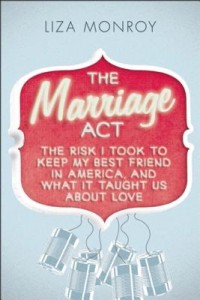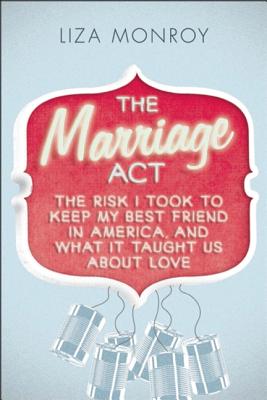 The Marriage Act: The Risk I Took to Keep My Best Friend in America, and What It Taught Us About Love
The Marriage Act: The Risk I Took to Keep My Best Friend in America, and What It Taught Us About Love
by Liza Monroy
Soft Skull Press. 320 pages, $16.95
IN HER LIFE, Liza Monroy confides in The Marriage Act, there have been three important men: her father, her boyfriend Julian, and her best friend Emir. She has barely seen her father since she was six years old, following her parents’ divorce. Julian lived in Manhattan, far from Monroy’s home in L.A., and, although they were engaged, their relationship was rocky. Emir, however, lived just three blocks away, and Monroy saw him whenever she felt she needed him. She needed Emir a lot.
Monroy and Emir met in college, both dreaming of making screenplays and films. He was in the U.S. on a student visa, a Muslim boy from a country Monroy called Emirstan. She had been running from her mother’s influence, and he was gay. While she was not gay, they had much else in common, became fast friends, and were soon inseparable. And in the weeks following September 11, 2001, when just being Middle Eastern was cause for suspicion, Emir’s visa was about to expire.
By that time, Monroy’s engagement had fallen apart in a messy, devastating way. She was afraid of love, but more terrified of being alone. She asked Emir to marry her, which seemed like a great solution: Emirstan was murderously intolerant of gay men, and deportation could be dangerous, even deadly. Even Emir’s own father was a homophobe. Marrying her gay best friend would allow Monroy to practice at marriage until she felt comfortable enough to have a “real” husband, at which time they could get divorced. Needless to say, Immigration and Naturalization Service frowned on marriage for a green card’s sake, to put it mildly; and, as luck would have it, Monroy’s mother was an INS agent. Risking deportation for Emir and a heavy fine for both, they asked themselves: what exactly makes a marriage? If the key ingredient is love, then Monroy and Emir had that. If it’s needing one another, they had that, too. Did marriage have to be about having sex and raising children?
With all the angst of a Woody Allen movie and a weak ability to keep mum about life-and-death secrets, Monroy describes the stress, misgivings, and melodramatic scenes, and finally how she almost sabotaged her own gutsy plan to keep her gay best friend in the U.S. It all sounds pretty madcap—and it would be, if the author weren’t so nervously repetitive and fussy. Monroy seems delighted to share pages and pages of agony about her inability to stick with her decision. It’s hard not to become irritated with the self-doubting discourse, the needless covertness, the anxious blame-the-parents passages, and the attempts at humor that miss the mark.
There is something of a surprise ending, but by this time it’s difficult to be surprised at what happens or to muster much sympathy for the central characters. What saves the book—or could save it for some readers—is the author’s bumbling sweetness as she feels her way through uncharted territory, learning as she goes.






